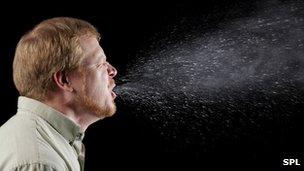Britons 'kissed through swine flu'
- Published
- comments

The survey compared behaviour during the pandemic in Britain, Argentina, Japan, Mexico and the US
Do you remember the "sneezing man in a lift", external public health advert? Released during the swine flu pandemic it was aimed at promoting the "Catch it, Bin it, Kill it" message.
But a survey published in the Lancet Infectious Diseases, external medical journal suggests that people in Britain were far less likely to adopt simple protective measures during the H1N1 pandemic in 2009 than those in Argentina, Japan, Mexico and the US.
Kissing
Researchers at Harvard School of Public Health in Boston questioned nearly 5,000 people. Just 25% of British people surveyed said they more frequently coughed or sneezed into their elbow or shoulder during the pandemic compared with 82% in Mexico and 84% in Argentina. Some 53% of Britons said they washed their hands or used hand sanitizer more frequently, compared with 89% in Argentina, and 72% in Japan and the US.
Just 2% of Britons said they avoided hugging or kissing family or friends compared with 46% of those questioned in Mexico and 21% in the US.
One of the study's authors, Dr Gillian SteelFisher said: "The wide variations between countries in our study shows that in the event of another serious outbreak of infectious disease, public perceptions have to be taken into account to best tailor and communicate policy approaches that need public support in each country."
The study did not set out to find out which of the nations was the most hygienic but rather to see whether increased handwashing and social distancing reduced H1N1 vaccination uptake. It did not, although overall vaccine rates were low in all the countries.
Studies like this clearly have limitations. These were telephone interviews with the respondents self-reporting their behaviour. Furthermore, the questions were posed several months after the end of the pandemic so recall may have been shaky.
But if the results are accurate the obvious next question is why Britons were less likely to adopt protective behaviour than other countries? There the survey doesn't help.
Mexico was hit first by swine flu and there was a great deal of initial fear and uncertainty about potential danger from the virus. So it understandable that people there took social distancing measures and personal protective behaviour more seriously than in Britain.
The supposed differences in behaviour between the US and UK are less easy to explain. It would have been helpful to have another European country to compare with the UK.
Alison Holmes, Prof of Infectious Diseases, Imperial College London told me: "This research is a good starting point but it begs the question, what next? It is vital that we reflect on how best to communicate public health messages. We need to be more scientific and understand how people make sense of recommendations."
That applies to the media as much as to the government and medical profession. I did many reports stressing the importance of basic hand hygiene - perhaps journalists need to re-think the way they present such information.
You may be asking why all this matters at all, given that the vast majority who got swine flu experienced a mild illness? It matters because there are plenty of other bugs out there that will happily hitch a ride on our skin and up our nostrils.
World record attempt
Despite all the limitations of the survey it does seem to suggest that not enough of us take hand hygiene and the health of the wider community seriously. There was a huge response to a blog I did last year about research at the London School of Hygiene and Tropical Medicine. It suggested that one in six mobile phones is contaminated with faecal matter.
Handwashing is not a very exciting or hi-tech public health measure. It does not grab the headlines like a new wonder drug. Nonetheless it is one of the most effective means of reducing the spread of viral infections like influenza, rotavirus and norovirus, and bacterial infections that cause diarrhoeal disease. In the developing world more children die from diarrhoeal disease, external than HIV/Aids, malaria and measles combined.
Good and bad hygiene habits start young. That's why Global Handwashing Day, external on October 15th will see schools across the UK attempting the break the world record, external for the largest simultaneous hand hygiene lesson.